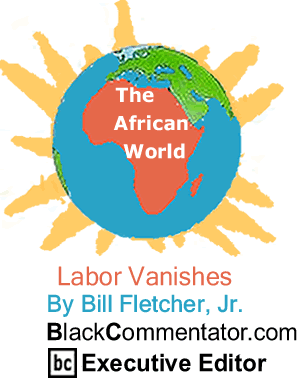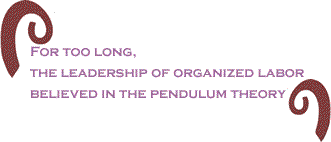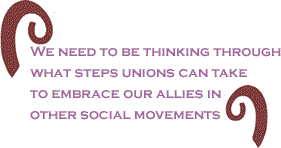
|
|||||||||||||||||||||||
 |

Custom Search
|
 |
Organized labor has vanished, as if it were part of the story line of a science fiction novel. Labor Day 2008 came and went and…nothing. I searched through the newspaper…nothing. I looked at the TV schedule…nothing. It was as if there is not and never was anything called organized labor. You may be saying that I am exaggerating this problem. After all, we just completed the Democratic Party Convention; we are beginning the Republican Party Convention; and Hurricane Gustav is terrorizing the Gulf Coast, therefore, there is too much other news. Yet, while all of that is true, topical stories are developed way in advance. TV stations identify, with plenty of time to spare, which documentaries they will show, as well as interviews they will hold. Organized labor seems to have vanished, at least from mainstream USA.
It would be easy to stop this commentary here and shake our heads at the anti-worker animus on the part of employers and governmental authorities. The problem is that unions themselves allowed this situation to worsen without sending out a battle cry and retooling themselves to face mighty corporate opponents. For too long, the leadership of organized labor believed in the pendulum theory, i.e., that things were rough, but that the pendulum would ultimately swing in the other direction and that success would soon be here. The problem is that the pendulum seems to have gotten stuck. While organized labor needs to do a hell of a lot more organizing, events since the 2005 split of the AFL-CIO (the largest labor federation in the USA) have demonstrated that fancy rhetoric and intense organizing are not enough. The vision of labor unionism itself must shift in a way that convinces working class people that it is a cause with which to unite, irrespective of whether one happens to currently be in a union or not. Secret deals with employers in order to secure bargaining rights; the suppression of dissent in the name of ‘unity’; fostering illusions that corporate America can be appealed to in order to realize the value of labor unions as partners in the future economic growth of the USA, are all recipes for ultimate disillusionment, disorganization and despair. Labor Day 2008, and this entire period up through the November 2008 national
elections, should actually be a period for labor union activists
to do some reflecting. During the course of several visits to South Africa I was struck by how different the union movement was there compared with the one we have in the USA. In addition to its leaders being fairly young (tending to be in their late 20s through early 40s) the movement is very dynamic. Part of being dynamic was/is grounded in a vision that the union movement is about changing society, or at least being part of a larger group that is actively changing society to the benefit of working class people. Rather than sitting on the side lines, or even lobbying and handing out financial contributions, the union movement in South Africa has focused on both the needs of its members as well as the steps that need to be taken to represent the interests of workers more generally in structurally changing the country. It seems to me that this is what Labor Day should be about. BlackCommentator.com
Executive
Editor, Bill Fletcher, Jr., is the Executive Editor of BlackCommentator.com,
a Senior Scholar with the Institute
for Policy Studies, the immediate past president of TransAfrica Forum
and co-author of the book, Solidarity Divided: The Crisis in Organized Labor and a New Path
toward Social Justice |
Any BlackCommentator.com article may be re-printed so long as it is re-printed in its entirety and full credit given to the author and www.BlackCommentator.com. If the re-print is on the Internet we additionally request a link back to the original piece on our Website. Your comments are always welcome. eMail re-print notice
If you send us an eMail message we may publish all or part of it, unless you tell us it is not for publication. You may also request that we withhold your name. Thank you very much for your readership. |
| |
| September 4, 2008 Issue 289 |
|
| Executive Editor: Bill Fletcher, Jr. |
| Managing Editor: Nancy Littlefield |
| Publisher: Peter Gamble |
| Est. April 5, 2002 |
Printer Friendly Version
in resizeable plain
text format or pdf
format. |

|
 |
 |
 |
| |
| |




























 On
one level none of this should be surprising. The percentage of
workers represented by labor unions has been on the decline since
1955 (35%) down to approximately 12% today. Unions have been on
the defensive with employers actively undermining the right of
workers to join or form unions, as well as blocking virtually
every effort on their part to raise the living standards of their
members. Successive U.S. Presidential administrations have been
actively hostile towards labor unions and the rights of workers
to join them. Quite ironically, today’s right-wing Republicans
insist that workers MUST choose the union to represent them by
secret ballot without mentioning that free choice does not exist
when employers are permitted to intimidate workers before they
cast their votes.
On
one level none of this should be surprising. The percentage of
workers represented by labor unions has been on the decline since
1955 (35%) down to approximately 12% today. Unions have been on
the defensive with employers actively undermining the right of
workers to join or form unions, as well as blocking virtually
every effort on their part to raise the living standards of their
members. Successive U.S. Presidential administrations have been
actively hostile towards labor unions and the rights of workers
to join them. Quite ironically, today’s right-wing Republicans
insist that workers MUST choose the union to represent them by
secret ballot without mentioning that free choice does not exist
when employers are permitted to intimidate workers before they
cast their votes.







